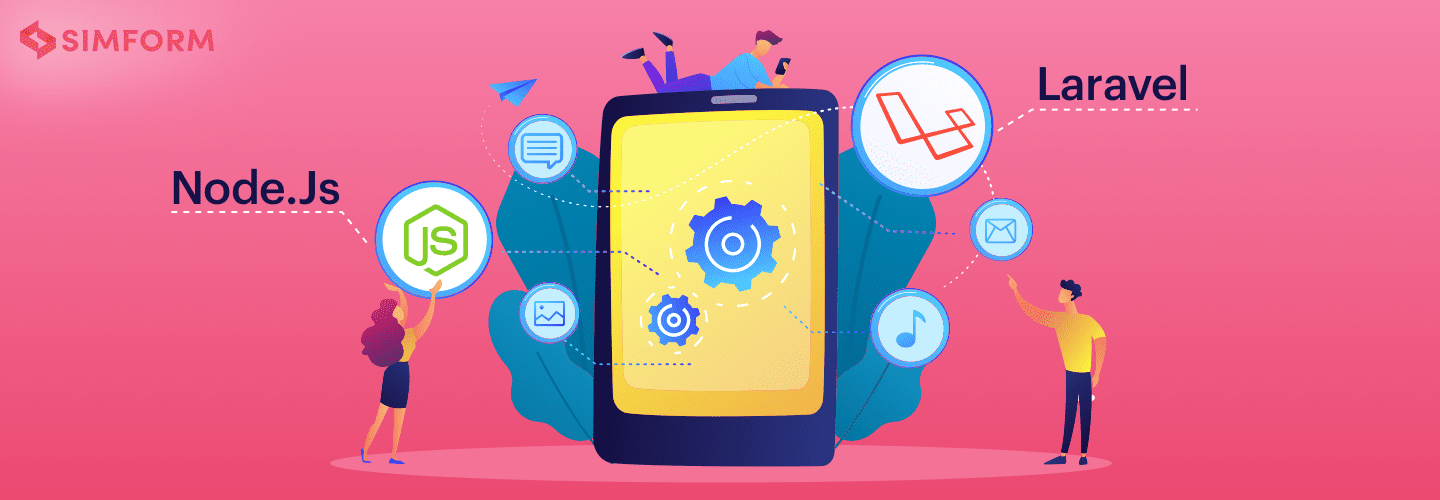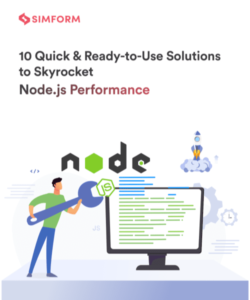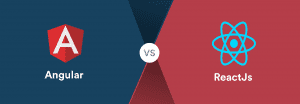Laravel vs Node.js: Everything You Should Know Before Ratifying Project Backend
So you have this exciting web app idea and you can’t wait to get started. You’ve done all the homework right from market & competitor research to design and usability strategy. The next step is to get on with the streamlined development process. But as soon as you get into the development phase, there’s a curve ball thrown at you. “Which backend framework to choose for the project?” The success of your web app is very well going to depend on what happens behind the scenes afterall.
Laravel vs Node.js is most often what it boils down to when choosing the perfect backend framework for a web application. In this article, we’ve expertly dismantled the Laravel vs Node.js debate to let you know which one is the most suitable for your project. We assess the two frameworks against the biggest concerns of app owners such as scalability, database support, developer talentpool, and many others. So go ahead and find out which of these two frameworks will go well with your priorities.
What is Laravel?
Laravel is an open-source PHP web framework known for its server-side handling of routing, HTML authentication, templating, and more. Created by Taylor Otwell, Laravel is written in PHP code and is based on Symfony that provides reusable modern PHP applications and reusable PHP components/libraries.
Since it is a web server-side-based framework comprising software packages, with Laravel, you can build applications with pre-defined architectures, customized backend services logic, web portal, lightweight templates, and full-stack apps as well as manage SaaS products.
Market usage stats of Laravel
- Laravel is the 12th most used web framework, with a market share of 9.45%. It’s also the 15th most-loved web framework, with 54.47% of modern developers supporting it.
- 702K live websites use Laravel; 1.83% belong to the top 1 million websites.
- Stackshare says more than 40K companies are using Laravel as of 2023.
Use cases of Laravel
- SaaS-based web applications
- On-demand video streaming applications
- e-Learning web apps
- Stock trading based web management systems
- Web apps with rewards and recognition features
- Multilingual CMS systems
- Self-hosted website-performance monitoring apps
Popular apps using Laravel as backend technology
- Laracasts, an e-learning website, offers various courses and serves as a platform where technical queries are answered and resolved by experts.
- Barchart, a financial portal, gained an advantage of the latest global market data in stock, currency exchange, trade offers, gold price, and more.
- Asgard CMS, a modular multilingual CMS, provides futuristic ready-to-use modules such as dashboard, media management, and flexible back-end support.
- World Walking,a charity led healthcare platform, focuses on provoking people to do more walking by offering rewards and recognition programs.
- Neighborhood Lender uses Laravel as the high-performance backend support to serve as a mortgage calculator with a wide range of financial functionalities, making complex mortgage processes more comfortable and straightforward.
What is Node.js? – An Overview
Node.js is a server-side, Javascript-based, cross-platform runtime environment that’s a massive open-source tool. It attributes its success as a high-performance, scalable framework to the single-threaded process used for web loads and an asynchronous programming model.
What’s more, you can use Nodejs-based frameworks such as Express, Socket.io, and Meteor.js within it to enhance the backend capability of a project. Designed with real-time and push-based architectures, the technology is known to build single-page applications, websites, and backend API services.
Here are some Market usage stats of Nodejs as a backend technology:
- Node.js is the most popular web framework, with a market share of 47.12%. It’s also the 8th most-loved web framework, with 67.36% of developers supporting it.
- As per W3Techs, Node.js is used by 2.0% of the website across the globe.
- Around 278K live websites use Node.js
- StackOverflow Trends has noted an increased discussion around Node.js over the last decade, covering almost 3.25% of questions as of 2022.
 Use cases of Node.js
Use cases of Node.js
- Streaming web applications
- Real-time software & Streaming apps (Collaboration tools used for video/audio conferencing, document editing, Chat applications, etc. )
- Complex Single-page apps
- Microservices
- IoT-based applications
- Backends and typical servers
- Developing REST APIs
- Scripting and automation
- Server-side rendering
Popular apps using Node.js as backend technology
- NASA revealed that Node.js made migrating data from legacy databases to a cloud database effortless. It created a single database for any query and reduced access time by 3x.
- Twitter launched Twitter Lite with a significantly faster launch time and quick loading on slower connections.
- Netflix decreased startup times and significantly improved performance. They migrated their backend from Java to Node.js that resulted in a decrease in startup time from minutes to a few seconds.
- Trello implemented instant propagation of updates. As the application organizes tasks on an agile basis, they wanted a tool that instantly reflects the updates without reloading the page.
Check how we helped Red Bull to build a scalable solution using Node.js
Laravel vs Node.js— Pros and Cons
Pros of Laravel
- Pre-packaged tools: Facilitates common tasks required for building web applications by offering ready-to-use Laravel package libraries for user authentication, testing API requests.
- Templating system: Uses a templating engine known as Blade, which offers enormous power to format data and create complex web-app layouts with easy navigation. It allows the addition of new modules like Laravel Mix and features without making any change in the core.
- Routing: Reverse routing is a unique feature that supports the automatic propagation of changes in routes into relevant links. In other words, it automatically creates Uniform Resource Identifiers (URIs).
- Automation with Artisan CLI: Offers the ability to automate any kind of recurring task which is related to the app’s specifications. It generates modern boilerplate codes to manage database tables, migrations, and implement custom commands conveniently.
- Automated testing: Offers expressive testing methods with PHPUnit that simulates user behavior by making requests to the application’s built-in functionality. This way, testing is less time-consuming and automated.
Cons of Laravel
- Lightweight: Typically, the lightweight feature of this framework is considered an advantage, but in this case, the lightweight nature leads to excessive backend congestion of database queries, ultimately leading to lower performance with an increase in data congestion.
- Library quality: While Laravel might be open-sourced and backed by a vast community, it also leads to an increase in less reliable third-party libraries.
- Community: Since the Laravel community is considerably large, the number of third-party libraries built and published is significant. It becomes difficult to evaluate which library is reliable and quality certified.
Pros of Node.js
- Unopinionated: Builds everything from scratch with fewer restrictions, which gives developers the freedom to code their own way.
- Non-blocking I/O System: Lets you process several requests simultaneously, resulting in more scalability and faster performance.
- Active Community: Allows access to readily available solutions and codes that makes easy for startups and beginner developers.
- Easy to learn: Developers with an experience in Javascript as a frontend language can easily adapt to the framework.
- Full-Stack Privilege: Allows Node.js developers to write frontend and backend both in Javascript. This enables smooth deployment of apps and reduces the learning curve.
- Caching facility: Caches single third-party modules in the application memory and eliminates the need to re-execute the code for faster response times.
- Extensive support: Assists developers with various tools commonly used for different purposes such as testing or identifying project dependencies.
- Node Package Manager (NPM): Provides a vast ecosystem of reusable code and a first module for Node.js developers allowing easy installation, management, and sharing of packages.
Cons of Node.js
- Productivity loss: Since everything needs to be written from scratch, you may experience a decline in productivity. Beginners find it difficult to build apps from scratch due to its unopinionated nature.
- Not suitable for extensive computing: Although Node.js supports complex apps, it doesn’t fare well with heavy computing (CPU intensive) apps. Additionally, it is less efficient at heavy calculations as it doesn’t support multi-threaded programming.
- Difficult to maintain code due to Async nature: Due to nested callbacks in Node.js and its heavy reliance on asynchronicity, it becomes tedious to maintain and difficult to understand code.
- Some of its tools lack quality– Some Node.js tools don’t match high-coding standards and are not correctly structured due to its open-source ecosystem.
Laravel vs. Node.js: A quick comparison
In the realm of web development, Laravel and Node.js are two popular frameworks that offer unique features and functionalities. Laravel, a PHP-based framework, emphasizes elegant syntax and a robust ecosystem for building web applications. On the other hand, Node.js, powered by JavaScript, enables developers to create high-performance, scalable applications with its event-driven architecture. This comparison table delves into the strengths and nuances of Laravel and Node.js, helping you make an informed choice for your project.
| Parameter for Comparison | Laravel | Node.js |
| Category | PHP framework | JavaScript runtime environment |
| Learning curve | Short | Long |
| Engine | Blade template engine | Google’s V8 engine |
| Execution | Synchronous | Asynchronous |
| Package manager | Compose package manager | Node Package Manager (NPM) |
| Concurrency | Multi-threading | Event-driven |
| Performance | Slow | Fast |
| Community | Small but rising | Vast online community |
| Documentation | Extensive | Inadequate |
| Integration with front-end libraries | Yes | No |
| Preferred Industry Vertical | Education, shopping, business, etc. | Arts and entertainment, internet and telecom, computer and electronics, etc. |
| Database supported | MySQL and MariaDB | Express JS, MongoDB, and MongooseJS |
Detailed comparison: Laravel vs. Node.js
Performance and speed comparison— Laravel vs Node.js
While performance should not be a killer factor for small projects, it becomes extremely important to consider it when building complex and large projects. With that being said, let’s compare Laravel and Node.js in terms of performance.
How does Laravel stand out in terms of performance?
The performance of Laravel-based applications can have implications on the success of a project, and it is said to be slow. But, its community suggests that it can be improved for better performance if optimized appropriately, which may allow applications to perform efficiently even under 20ms.
Usage of Cache tags allow applications to quickly load the pre-stored information that allows a faster response time, leading to improved performance.
How does Node.js stand out in terms of performance?
As it inherits the asynchronous and non-blocking from Javascript modules, Node.js creates a perfect environment for small tasks (micro-operations/tasks) that don’t affect the main application thread. What’s more, with the V8 Javascript engine, multitasking becomes more efficient and functions at a lightening speed.
The framework processes many requests simultaneously compared to other backend solutions. In fact, a large number of tech giants are turning towards Node.js for its performance.Netflix utilizes Node.js to power its user interface and enhance server-side rendering. PayPal adopted Node.js to enable faster iterations and seamless scalability. Walmart employs Node.js for efficient handling of high traffic volumes and enhancing real-time inventory management.
Application architecture— Laravel vs Node.js
When choosing a framework, it’s important to choose flexibility and avoid any strict enforcement of architecture and guidelines. As a matter of fact, it’s always recommended to treat a framework as a comprehensive guide, not methods, and standards. That said, let’s juxtapose Laravel and Node.js with each other and check whether they are flexible in terms of architecture.
What kind of architecture does Laravel support?
Laravel follows the Model-View-Controller (MVC) architectural pattern that provides the ability to split developer roles for a more comfortable rapid development process. In other words, while a frontend developer is working on the views, a backend developer can be working on the controller logic simultaneously.
The MVC patterns also offer full control over the application, which might come in handy to choose application-specific routes and customize how your application appears on a global scale. This improves the SEO of the application in return as well. Implementing external APIs and reusing application logic is effortless with Laravel’s MVC architecture. Thus, the creation of immutable backend support for any web application is always possible.
What kind of architecture does Node.js support?
Under the hood, Node. js leverages the Single-threaded Event Loop architecture that enables it to handle multiple concurrent requests with high performance. However, Node.js also lets you use MVC/ MVP architecture pattern, which eases isolating and onboarding issues in the application codebase. In addition to this, it creates multiple views for the same data and supports asynchronous communication between various components.
Here’s how you benefit from the async architecture of Node.js:
Scalability— Laravel vs Node.js
Full-fledged frameworks significantly influence the web application scalability, therefore, the right choice of appropriate framework is important. Here’s how Laravel and Node.js stand out in terms of scalability.
Is Laravel scalable?
Popular apps using Laravel for years are scaling up their applications without any limitation. Laravel inherits scalability from PHP environments as it proffers support to rapidly growing businesses. By choosing a good database structure and load balancer, Laravel can achieve massive horizontal scaling.
Using MySQL, AWS if needed, and conducting advancing caching methods, Laravel applications can scale as per requirement flexibly.
How scalable is Node.js?
Node.js builds highly-scalable applications. The non-blocking I/O and event-driven model handles multiple concurrent requests. Moreover, the event-loop mechanism enables the server to process maximum requests. What’s more, Node.js makes the best compatibility with microservices by segregating applications into smaller parts. That way, it’s efficient to allocate tasks among different development teams and build applications more quickly and scalably.
Ease of testing— Laravel vs Node.js
To be able to work without a glitch under continuous, high load and growing market expectations, your application development project needs to go through a series of tests to ensure compliance with the UI standards, compatibility, and usability. Here’s how Laravel and Node.js stand out when compared with testing.
How easier is it to test a Laravel app?
Given the fact that Laravel functions with PHP, there are many testing tools available to ensure the creation of a bug-free application. However, it is understandable to feel overwhelmed by the number of tools and resources available for testing. To make the testing process more comfortable, Laravel tests code in two distinct levels known as Unit tests and Feature tests.
Laravel, by default, has robust testing documentation and provides all the tools you need to test the application environment at several levels, including the ability to conduct mock tests by mocking application code execution and events.
How easier is it to test Node.js/ applications?
Node.js offers competent testing and debugging capabilities with its rich ecosystem of third-party package libraries. Various automated testing tools/frameworks like Mocha, Jest, Lab and Code, Jasmine, and AVA create a sound testing ecosystem for Node.js apps. Moreover, you could use testing libraries such as Mocha, Jest, and Chai to offer a seamless, bug-free experience to your users.
Microservices compatibility— Laravel vs Node.js
Is Laravel compatible with microservices architecture?
PHP supports microservices architecture, and it is evident that Laravel supports microservices architecture as well. How does Laravel do it? The app is broken down modularly into small building blocks, each with its function and responsibility. These functions communicate with each other using language-agnostic web APIs, and as a result, the app becomes compatible with the microservices architecture.
For the past few months, the need to use Laravel with microservices architecture was so intense that a developer came up with the right framework – Lumen. It serves a similar purpose and is a leaner, smaller, and lighter version of Laravel.
Is Node.js compatible with Microservices architecture?
Both Node.js and Microservices build smaller parts of services and code modules. Node.js is suitable for developing scalable apps as it’s efficient at handling multiple concurrent requests. Thus, it makes an absolute combination for building enterprise-grade complex applications with higher scalability.
Database support— Laravel vs Node.js
How good is the database support for Laravel?
Laravel currently supports four database system types: Postgres, MySQL, SQLite, and SQL. The fluent query builder, raw SQL, and Eloquent ORM make the process of interacting with these databases simple. Even establishing multiple database connections is more comfortable to configure with Laravel.
Whether other databases will support Laravel, only the future can tell. But say, you are comfortable with the databases that Laravel supports, you will face no limitations in creating a wholly controlled relationship between the database and the web app.
How good is the database-support for Node.js?
Node.js supports all kinds of databases like relational and NoSQL databases. However, it’s best to use a NoSQL database like MongoDB as it stores data in JSON objects, which offers more accessibility for Javascript-based backends like Node.js.
As a matter of fact, you can use “mongoose” to manage relationships with data. The object data-modeling library support is exclusively built for Node.js and MongoDB. Moreover, it boosts productivity by increasing code readability, maintaining code flexibility and providing a modelling for applications’ data among others.
Community— Laravel vs Node.js
How big is the community around Laravel?
PHP holds 77.4% of the market when it comes to server-side programming of web applications. Laravel has a vast community with more than 52,182 active users, 23.7K forks, 73.7k Github stars, and 4.5k real-time watchers..
The maximum time taken to resolve a Laravel query by the community is not more than three days. PHP developers and Laravel combined has a powerful community, where developers share Laravel podcasts, news, documents, repositories, etc. Following are some of the places where you can meet the Laravel community:
How big is the community around Node.js?
Node.js holds a well-supported and robust community. It is reported on StackOverflow that 46.31% of professional developers use Node.js for frameworks, libraries, and tools. Tech giants such as Amazon, Facebook, and Google have made significant contributions to the Node.js environment, making the technology more credible.
There are several communities and online user forums for Node.js such as,
Hiring developers— Laravel vs Node.js
How convenient is it to hire Laravel developers?
When hiring Laravel developers, you can expect to find a pool of experienced and skilled professionals due to Laravel’s popularity as a PHP framework. Laravel has a large community (52K members) and extensive documentation, making finding developers proficient in the framework relatively more straightforward. On average, you can expect to pay between $25 and $100 per hour for Laravel developers, with rates typically lower in regions like Southeast Asia and higher in countries like the United States or Western Europe.
How convenient is it to hire Node.js developers?
Hiring Node.js developers provides access to a vast talent pool of skilled professionals due to the significant popularity and demand for building scalable, high-performance applications. The average cost of hiring Node.js developers is slightly higher than Laravel developers due to their expertise in building client and server-side applications with JavaScript. On average, the hourly rates for Node.js developers range from $30 to $150, with rates again varying based on factors such as location and experience.
Conclusion
We hope the comparison must’ve helped you look beyond the Laravel vs Node.js debate and pick the appropriate backend framework for your next web application. Both the technologies present some tough-to-overlook features, and we also highlighted some of the potential pitfalls of using them. Let’s conclude with the most suitable use case for both the frameworks.
Choose Laravel, if:
- You want built interactive website layouts with appealing content.
- Your vision is to create an advanced application without adding any overhead components or additional costs by leveraging the Blade Template Engine of Laravel.
- You want to take advantage of various widgets with JS and CSS compatibility to create customized web and real-time apps.
- You require an excellent documented framework with constant native support from a community that is large.
- Your project requirement is to build a web application quicker and faster with object-oriented libraries.
- Your goal is to create an SEO-friendly and reliable web application with Laravel’s security features.
Choose Node.js if:
- You want to build a web application to stream content.
- You want to build a performant single-page application.
- You want to build web applications enriched with efficient data processing capabilities.
- You wish to create a real-time multi-user web application.
- You want to create web browser-based game applications.









